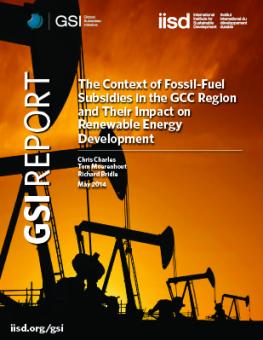
The Context of Fossil-Fuel Subsidies in the GCC Region and Their Impact on Renewable Energy Development
This discussion paper looks at fossil-fuel pricing and subsidies in the political, social and economic context of Gulf Cooperation Council (GCC) countries: Bahrain, Kuwait, Oman, Qatar, Saudi Arabia and the United Arab Emirates.
It provides an overview of IEA and IMF estimates of fossil-fuel subsidies in GCC countries, as well as additional GSI price-gap calculations on subsidies for gasoline and diesel used as transport fuels and electricity generation. The paper then analyzes the impact that fossil-fuel subsidies have on renewable energy development in the region. It finds that even partial reform of fossil-fuel subsidies would assist GCC countries in meeting their economic, fiscal, social and environmental objectives, but that political opposition to increased energy prices is a key barrier to change.
Participating experts
You might also be interested in
Saudi Arabia's grandiose climate plans struggle to take off
When Crown Prince Mohammed bin Salman announced Saudi Arabia’s "green initiative" this year he did so with the type of eye-catching pledge that has come to characterise the young royal's grandiose plans to modernise the kingdom.
Energy Pricing Reforms in the Gulf: A trend but not (yet) a norm
This GSI paper summarizes recent fossil fuel subsidy reforms in the Gulf countries of Bahrain, Kuwait, Oman, Saudi Arabia, United Arab Emirates and Qatar, putting them in the context of wider developmental challenges and calling for more focused international support to energy pricing reforms in the region.
The Cost of Fossil Fuel Reliance
Government support for fossil fuels reached at least USD 1.5 trillion in 2023, new data shows.
Increased Support Needed to Achieve India's Clean Energy Goals
India is on track to achieve many of its 2030 clean energy goals but needs to step up government support measures to accelerate the deployment of offshore wind, electric vehicles, and green hydrogen, according to a new report.